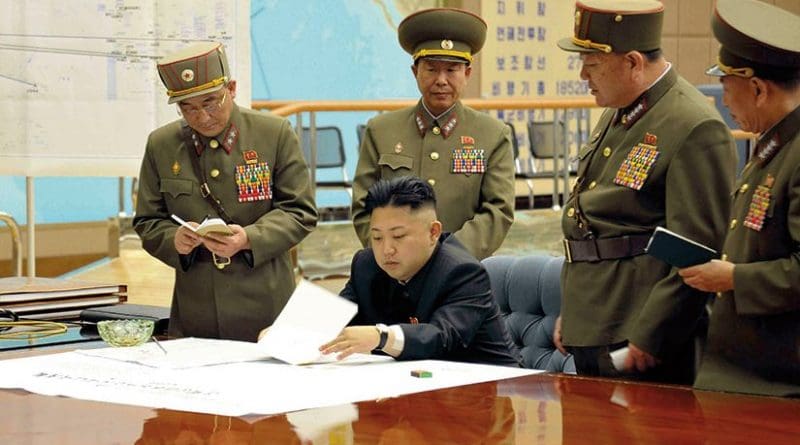North Korea Sanctions: Will China Get Tougher? – Analysis
By RSIS
China appears to have taken tougher measures against North Korea in response to its fourth nuclear test. It may be prepared to be harsher if Pyongyang continues with its provocations.
By Xiaohe Cheng*
China has shown unexpected readiness to punish Pyongyang after its fourth nuclear test on 1 January 2016, in contrast with its mild response to previous provocations.
North Korea’s nuclear and missile weapon programmes have become one of China’s biggest diplomatic and security challenges along the former’s periphery. The Chinese leadership were extremely uncomfortable with the international opprobrium that China received for its moderate responses each time North Korea conducted a nuclear or missile test. The fourth nuclear test and the satellite launch that followed have since elicited a tangible drift in China’s policy toward North Korea’s brinkmanship.
Endorsing the Harshest Sanctions
Previously, China had been reluctant to adopt punitive measures towards North Korea for fear that harsher measures may dim any hopes of Pyongyang’s return to the negotiating table, and such actions could lead to unwanted consequences and political instability on the Korean peninsula. Beijing’s endorsement of the UN Security Council (UNSC) Resolution 2270 clearly demonstrates China’s willingness to impose harder measures to punish its defiant neighbour. This change of Chinese attitude was mainly caused by three basic considerations:
First, as the previous moderate sanctions against North Korea had failed to deter North Korea from developing its nuclear and missile programmes, it was only to be expected that the UNSC would take further actions, such as closing the sanction loopholes and enlarging the scope of the sanctions.
Second, with South Korea determined to confront North Korea in a tit-for-tat fashion by shutting down the Kaesong industrial complex – the only remaining economic link between the two Koreas – China had to follow suit, lest any hesitation on its part were to risk alienating Seoul, with whom Beijing has been painstakingly cultivating friendship the past several years.
Third, North Korean provocations have become too frequent and too dangerous to be tolerated, and United States’ and South Korea’s patience with North Korea has worn thin.
Resolution 2270 carries some ‘hard-hitting’ elements that may hurt North Korea badly. It imposes sectoral sanctions targeting North Korea’s trade in resources and bans transfers of aviation fuel to North Korea. Without doubt, such a new punitive measure can be expected to undermine Pyongyang’s ability to continue its nuclear and missile programmes, and also pose a threat to North Korea’s economic and political stability.
More importantly, the resolution could further impose new cargo inspection and maritime procedures to limit North Korea’s ability to transfer UN-prohibited items. In fact, the Philippines recently took the lead in seizing a North Korea cargo ship right after the resolution was passed.
North Korea at China’s Mercy
Resolution 2270 represents the harshest sanctions the UNSC has ever imposed on North Korea. As results of the new sanctions unfold, some analysts have expressed their concerns that the sanctions may lack teeth since the resolution allows exceptions to the ban on mineral exports, leaving states to determine whether those exceptions are applied on goods that affect the livelihood of North Koreans, or whether they will impact on North Korea’s nuclear or ballistic missile programs.
Certainly, the articles on exception will protect some Chinese companies from going bankrupt caused by sudden economic paralysis and avert high legal costs for any breach of contracts, but also offers China some maneuvering room to influence North Korean behaviour.
In other words, even as Beijing tries to reduce its own economic loss caused by the resolution, it is also in a position to tighten or loosen its economic grip on Pyongyang, depending on the latter’s external behaviour. As such, the exception articles thus leave North Korea at China’s mercy to some extent.
China May Resort to New Tougher Tools
In order to inflict pain on North Korea for its brinkmanship, China has no reason to abuse the exception articles. So far, Beijing has been steadfastly implementing the UNSC resolutions. China’s endorsement and implementation of the new resolution has angered North Korea, with the latter repeatedly making implicit criticisms of China for its “unprincipled position” and “collusion with the United States”.
Nevertheless, North Korea has continued to undertake a number of counter-measures in gross violation of the UNSC resolutions, including test-firing a submarine-launched ballistic missile. The signs point to the imminence of a fifth nuclear test, which can be expected to lead to another round of showdown between North Korea and international community.
Beijing and other global stakeholders may be forced to resort to sharper instruments in their diplomatic toolkit in an attempt to rein in Pyongyang. These may include banning North Korea from sending workers overseas and suspending tourism between China and North Korea. Adoption of either of these will be tantamount to rubbing salt into North Korea’s wounds.
For China, imposing harsh sanctions against North Korea is the last resort in dealing with its nuclear and missile provocations and may cause unwanted consequences. But with China showing determination in enforcing these new North Korea-related sanctions, it is more than likely that the new Chinese leadership is able to weather all kinds of results, whether good or bad.
Certainly, China does not want to punish North Korea just for the sake of doing so. Most importantly, the ultimate objective of the sanctions it has endorsed should help to drag North Korea back to the negotiating table and bring stability back to the Korean Peninsula.
*Xiaohe CHENG is an Associate Professor at the School of International Studies, Renmin University of China. He contributed this specially to RSIS Commentary.

